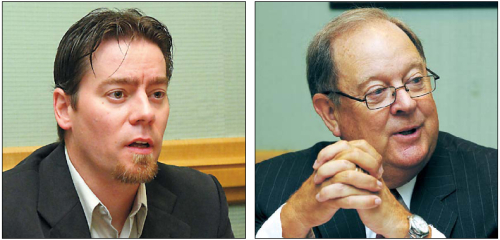Korea’s growing technological prowess and the business community’s brisk participation in standardization works will help expand global markets for smart grids, executives of the Institute of Electrical & Electronics Engineers’ Standards Association said.
The standards body is a unit within the IEEE, the world’s largest professional association for the advancement of technology. The U.S.-based non-profit organization develops international standards in industries ranging from energy, information technology and telecommunications to biomedicine and nanotechnology. It has 400,000 individual and corporate members in 160 countries including Google Inc., Intel Corp., Lockheed Martin Corp. and Korea’s KT Corp. and LG Electronics.
The standards body is a unit within the IEEE, the world’s largest professional association for the advancement of technology. The U.S.-based non-profit organization develops international standards in industries ranging from energy, information technology and telecommunications to biomedicine and nanotechnology. It has 400,000 individual and corporate members in 160 countries including Google Inc., Intel Corp., Lockheed Martin Corp. and Korea’s KT Corp. and LG Electronics.

Although a relative latecomer to the global standards scene, Korea’s membership has quickly expanded on the back of robust progress in growth engine sectors such as smart grid, 3-D and telecommunications, said Bill Ash, the IEEE-SA’s strategic program manager.
“We started collaborating just a few years ago as we realized that Korea is the market that we want to be engaged in,” he recently told The Korea Herald.
“We either look at smart grid or telecommunications in order to be effective worldwide. Korea is an important market for the development of technology, so we see it as a strong player as to grow the market and the industry.”
The 127-year-old association’s major focus is now on smart grids, as the nascent technology could boost energy efficiency and curb greenhouse gas emissions. The system allows homes and facilities to monitor output and demand through real-time communications between power suppliers and consumers.
“We see the ability to bring renewable energies and reduce dependency on fossil fuel (from smart grids),” Ash said. “We see this as an emergence of technology and this is really coming to an era where we’re actually starting to see the power of IT and telecommunications.”
Korea has been fostering smart grids as one of 10 key clean technologies over the past few years. The government joined forces with industry leaders to allocate 27.5 trillion won ($25.6 billion) for nationwide commercialization by 2030.
The Ministry of Knowledge Economy projects smart grids to create 50,000 jobs, cut emissions by 230 million tons and save energy imports of 47 trillion won a year by then.
In late 2009, multiple consortiums led by KEPCO, SK Telecom, KT and LG Electronics built their test-bed systems on Jeju.
“It was a very unique experience on how they’re looking on dealing with the problems that they have,” Ash said, referring to a tour to the facilities last week.
“I think Korea’s doing an excellent job on green technology. That’s one of the reasons why we are collaborating and partnering with the industry.”
On Wednesday, the IEEE-SA clinched an agreement with the state-run Korean Agency for Technology and Standards to collaborate on the global standardization for smart grid, 3-D, nanotechnology, light-emitting diodes and other fields.
Under the deal, the two partners will exchange information and experts, jointly host workshops and help set up related infrastructure.
Richard Hulette, chair of the organization’s standards board, said the IEEE-SA plans to step up collaboration with government bodies and industry participants here. Its partners also include the Telecommunications Technology Association and The Korean Society of Automotive Engineers.
“In order to be globally relevant, we need Korea’s participation and the interaction between IEEE SA and the Korean market,” Ash said.
By Shin Hyon-hee (heeshin@heraldcorp.com)








![[Graphic News] More Koreans say they plan long-distance trips this year](http://res.heraldm.com/phpwas/restmb_idxmake.php?idx=644&simg=/content/image/2024/04/17/20240417050828_0.gif&u=)
![[KH Explains] Hyundai's full hybrid edge to pay off amid slow transition to pure EVs](http://res.heraldm.com/phpwas/restmb_idxmake.php?idx=644&simg=/content/image/2024/04/18/20240418050645_0.jpg&u=20240419100350)







![[KH Explains] Hyundai's full hybrid edge to pay off amid slow transition to pure EVs](http://res.heraldm.com/phpwas/restmb_idxmake.php?idx=652&simg=/content/image/2024/04/18/20240418050645_0.jpg&u=20240419100350)

![[Today’s K-pop] Illit drops debut single remix](http://res.heraldm.com/phpwas/restmb_idxmake.php?idx=642&simg=/content/image/2024/04/19/20240419050612_0.jpg&u=)